Top Rankings
Spring Lake Park School District ranks among the top 20% of public school district in Minnesota for:
Category
Attribute
Diversity
Most diverse schools (Top 1%)
Community Size
Largest student body (number of students) (Top 1%)
For the 2025 school year, there are 7 public elementary schools serving 3,965 students in Spring Lake Park School District. This district's average elementary testing ranking is 4/10, which is in the bottom 50% of public elementary schools in Minnesota.
Public Elementary Schools in Spring Lake Park School District have an average math proficiency score of 39% (versus the Minnesota public elementary school average of 47%), and reading proficiency score of 45% (versus the 51% statewide average).
Minority enrollment is 54% of the student body (majority Hispanic and Black), which is more than the Minnesota public elementary school average of 40% (majority Black and Hispanic).
Overview
This School District
This State (MN)
# Schools
12 Schools
1,655 Schools
# Students
6,140 Students
571,925 Students
# Teachers
364 Teachers
40,363 Teachers
Student : Teacher Ratio
17:1
17:1
District Rank
Spring Lake Park School District, which is ranked within the bottom 50% of all 522 school districts in Minnesota (based off of combined math and reading proficiency testing data) for the 2021-2022 school year.
The school district's graduation rate of 85% has increased from 83% over five school years.
Overall District Rank
#309 out of 527 school districts
(Bottom 50%)
(Bottom 50%)
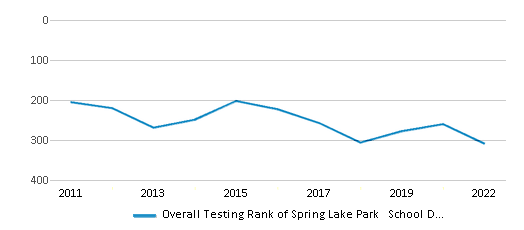
Math Test Scores (% Proficient)
38%
45%
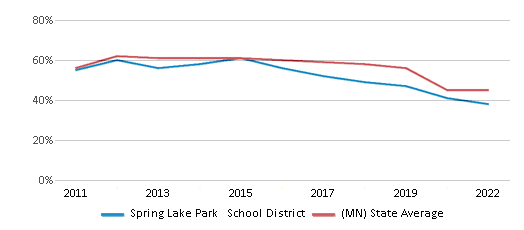
Reading/Language Arts Test Scores (% Proficient)
45%
51%
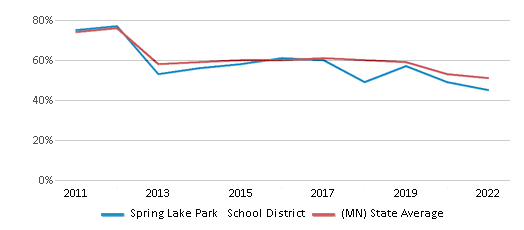
Science Test Scores (% Proficient)
36%
41%
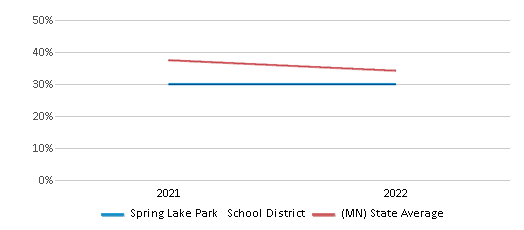
Graduation Rate
85%
84%
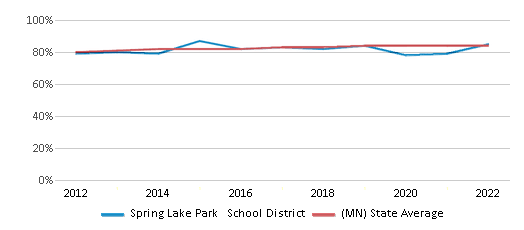
Students by Ethnicity:
Diversity Score
0.71
0.61
# American Indian Students
39 Students
10,480 Students
% American Indian Students
1%
2%
# Asian Students
544 Students
42,165 Students
% Asian Students
9%
7%
# Hispanic Students
1,198 Students
65,127 Students
% Hispanic Students
19%
12%
# Black Students
915 Students
70,794 Students
% Black Students
15%
12%
# White Students
2,892 Students
344,281 Students
% White Students
47%
60%
# Hawaiian Students
13 Students
676 Students
% Hawaiian Students
n/a
n/a
# Two or more races Students
539 Students
38,402 Students
% of Two or more races Students
9%
7%
Students by Grade:
# Students in PK Grade:
161
10,698
# Students in K Grade:
414
57,031
# Students in 1st Grade:
467
61,859
# Students in 2nd Grade:
446
63,560
# Students in 3rd Grade:
443
61,751
# Students in 4th Grade:
452
63,575
# Students in 5th Grade:
428
63,290
# Students in 6th Grade:
406
63,180
# Students in 7th Grade:
443
53,666
# Students in 8th Grade:
453
53,924
# Students in 9th Grade:
479
4,107
# Students in 10th Grade:
537
4,634
# Students in 11th Grade:
514
4,740
# Students in 12th Grade:
497
5,910
# Ungraded Students:
-
-
District Revenue and Spending
The revenue/student of $15,296 in this school district is less than the state median of $17,854. The school district revenue/student has stayed relatively flat over four school years.
The school district's spending/student of $13,565 is less than the state median of $18,580. The school district spending/student has stayed relatively flat over four school years.
Total Revenue
$94 MM
$15,547 MM
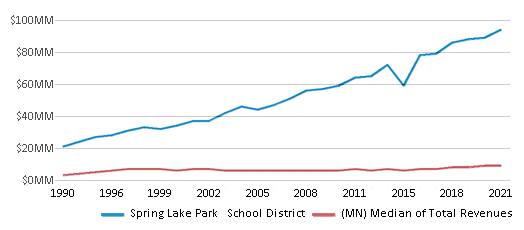
Spending
$83 MM
$16,179 MM
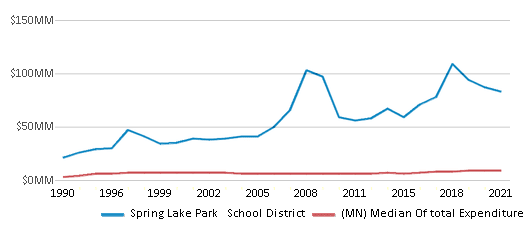
Revenue / Student
$15,296
$17,854
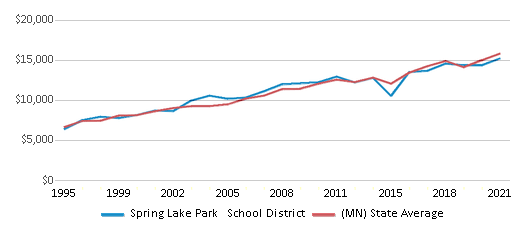
Spending / Student
$13,565
$18,580
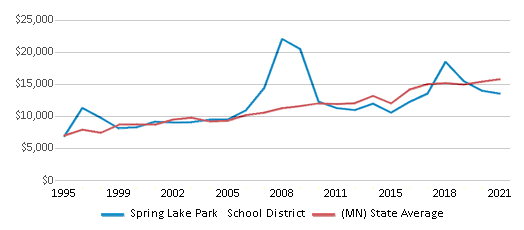
Best Spring Lake Park School District Public Elementary Schools (2025)
School
(Math and Reading Proficiency)
(Math and Reading Proficiency)
Location
Grades
Students
Rank: #11.
Elementary Lighthouse
(Math: 60-79% | Reading: ≥80%)
Rank:
Rank:
10/
Top 5%10
7925 Able Street Ne
Minneapolis, MN 55432
(763) 600-5200
Minneapolis, MN 55432
(763) 600-5200
Grades: 1-6
| 37 students
Rank: #22.
Northpoint Elementary School
(Math: 65-69% | Reading: 50-54%)
Rank:
Rank:
8/
Top 30%10
2350 124th Ct
Minneapolis, MN 55449
(763) 600-5700
Minneapolis, MN 55449
(763) 600-5700
Grades: K-4
| 515 students
Rank: #33.
Slp Schools Online Elementary School
(Math: 40-59% | Reading: 60-79%)
Rank:
Rank:
8/
Top 30%10
1415 81st Ave Ne
Minneapolis, MN 55432
(763) 600-5200
Minneapolis, MN 55432
(763) 600-5200
Grades: K-6
| 11 students
Rank: #44.
Woodcrest El. Spanish Immersion
(Math: 50-54% | Reading: 40-44%)
Rank:
Rank:
5/
Bottom 50%10
880 Osborne Rd Ne
Minneapolis, MN 55432
(763) 600-5800
Minneapolis, MN 55432
(763) 600-5800
Grades: K-4
| 555 students
Rank: #55.
Westwood Intermediate & Middle School
(Math: 34% | Reading: 49%)
Rank:
Rank:
4/
Bottom 50%10
711 91st Ave Ne
Minneapolis, MN 55434
(763) 600-5300
Minneapolis, MN 55434
(763) 600-5300
Grades: 5-8
| 1,682 students
Rank: #66.
Centerview Elementary School
(Math: 40% | Reading: 31%)
Rank:
Rank:
3/
Bottom 50%10
10365 Davenport Street Ne
Minneapolis, MN 55449
(763) 600-5500
Minneapolis, MN 55449
(763) 600-5500
Grades: K-4
| 640 students
Rank: #77.
Park Terrace Elementary School
(Math: 33% | Reading: 25%)
Rank:
Rank:
2/
Bottom 50%10
8301 Terrace Rd Ne
Minneapolis, MN 55432
(763) 600-5600
Minneapolis, MN 55432
(763) 600-5600
Grades: PK-4
| 525 students
Recent Articles

Year-Round Or Traditional Schedule?
Which is more appropriate for your child? A year-round attendance schedule or traditional schedule? We look at the pros and cons.

Why You Should Encourage Your Child to Join a Sports Team
Participating in team sports has a great many benefits for children, there is no doubt. In this article you will learn what those benefits are.

White Students are Now the Minority in U.S. Public Schools
Increasing birth rates among immigrant families from Asia and Central and South America, combined with lower birth rates among white families, means that for the first time in history, public school students in the United States are majority-minority. This shift in demographics poses difficulties for schools as they work to accommodate children of varying language abilities and socio-economic backgrounds.





